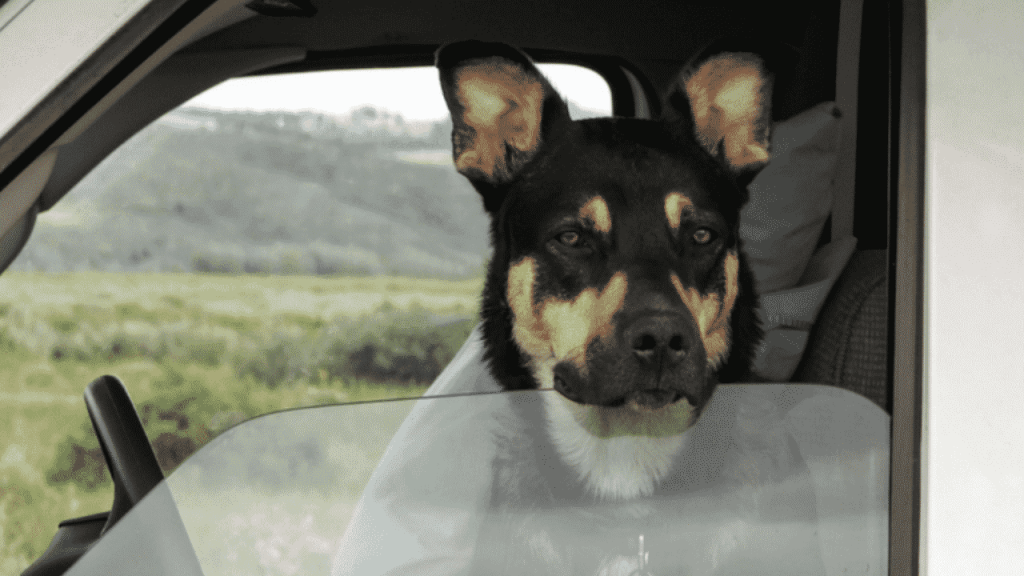Once the weather gets warm, we’re all ready to go camping with the family. One of the great things about RV travel is that you can take your pets with you. However, having your pets in your RV comes with a few challenges. You can’t take your pet everywhere.
You need to be able to keep your pet comfortable in your RV when you’re away. Follow these tips to be sure to keep them safe from the dangers of heat stroke.
Temperatures Inside the RV

We’ve all heard the warnings about the dangers of leaving pets in a parked car. According to the Human Society, on an 85-degree day, the temperature inside a parked car (even with the windows left slightly opened) can soar to 102 degrees in just 10 short minutes. Similar things happen in an RV.
If you are at a campground and connected to power, you might not think this is a concern. However, what happens if you lose power or there is a problem with your air conditioner while you are out sightseeing?
There are several different temperature control sensors that may help in these situations. They monitor the indoor temperature and send notices to your cell phone. Go Pet Friendly is a terrific resource that reviews pet-friendly products and places. They have an in-depth comparison of several different options with the pros and cons of each.
Temperatures Outside the RV

If you bring your pets along on your outdoor adventures, don’t forget to be aware of how the heat outside may affect them differently than you.
The danger is more significant for dogs because they generally spend more time outdoors than other pets. Many dog owners bring them along for hikes or for a day in the park to toss the frisbee. Just like us, dogs generate heat when they play and exercise.
A major difference, however, is that dogs don’t have sweat glands like we do to help them cool off. Instead, they mainly depend on panting to get rid of excessive heat. Combine that fact with many dogs’ love of play and exercise and you’ve got a recipe for potential disaster on warm, hot, and/or humid days.
Heat Stroke
It is important to note, that animals can sustain brain damage or even die from heatstroke in just 15 minutes. Heat stroke can affect all pets, but some cats and dogs because of age, breed, weight, or other medical conditions are more at risk.
Symptoms to watch for include excessive thirst, thick saliva, heavy panting, lethargy, dark tongue, rapid heartbeat, lack of coordination, and collapse.
If your pet shows any of these symptoms, get him or her out of the heat, preferably into an air-conditioned area or vehicle, and then to a veterinarian immediately. Applying cool, wet towels to the groin area, stomach, chest, and paws can also help. Be careful not to use ice or cold water and don’t over cool your pet.
Prevention

Even better than quick treatment is to prevent heat stroke from occurring in the first place. Follow these simple tips to ward off potential dangers:
- Be sure your pet has plenty of water to drink.
- If you crate your pet inside when you leave, be sure the crate will not be in direct sunlight.
- If you are outside playing, be sure there is adequate shade for resting.
- Provide a small tub of water or hose for cooling down.
- Finally, providing a fan both in and outdoors for air circulation and little breeze can make a big difference as well.
Keep Your Pet’s Paws Safe
When walking your pets, keep in mind that hot sidewalks, pavement, and parking lots can not only burn paws, they also reflect heat onto the animal’s body, which increases their risk of heatstroke. When the air temperature is 86 degrees, the asphalt can reach 135!
Just imagine what that can do to your canine or feline companions’ sensitive foot pads. Always test the pavement with your hand before setting out.
When possible, walk early in the morning or late at night when it’s cooler. Don’t forget to carry plenty of water and take frequent breaks in the shade. Be aware that overweight pets and short-nosed dog breeds have a higher risk of problems with warm-weather exercise.
The most important thing to remember that if it is hot for you, it is even hotter for your pet.
Do you have any thoughts on this subject? Leave a comment below!









